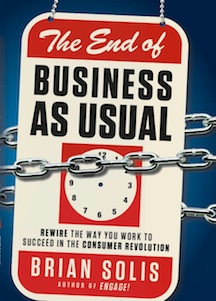Business used to be so simple.
Manufacturers made things. Stores stocked them. Consumers bought them. Rinse and repeat.
Ah, it sounds so quaint standing in the marketplace madness that is 2011.
Brian Solis brings to this topic his unique mix of entrepreneurism, diligent observer, and engaged analyst. He begins with a proclamation in the title: "The End of Business as Usual" and goes on to explore how the now fully connected consumer changes the rules of the game. In the end it's all about loyalty, in a world where the promiscuous consumer has the digital tools at his disposal to jump from brand to brand, and from seller to seller, forgoing relationships for siren song of 'lower price.'
Ah, if only there was service.
Solis spends the first half of this meaty book roaming across the new media landscape. The empowered consumer is now engaged in the practice of finding and sharing information. This changes how they make decisions, and influence their peers. And most importantly, it changes how brands must engage and remain relevant to keep customers.
Then Solis digs in to the actual practices and solutions that executives can use to impact their business. Much of this comes down to prioritization -- balancing the needs of traditional and connected customers. And perhaps most challenging, how to get the teams inside companies to play nice, balancing current business practices with emerging new tools and solutions.
The larger message of the book for business is that the changes in the way we engage on the web are fundamentally changing the relationship that consumers have with products and brands. Customers expect human service, real engagement, and authenticity, and are not shy about sharing their frustrations and disappointments with the wider web.
To remain relevant, companies need to embrace rather than ignore technology, and accept and even welcome the newly empowered consumer into their brand experience. Anything less is likely to be catastrophic.
Here are 5 Brian Solis tips on how to avoid basic social media missteps, as shared with Shira Lazar of WhatsTrending.com.
- Showing up isn't enough. Customers and prospects are busy, connected and interacting with everybody but you today. An engagement program -- has to extend beyond "follow us on Twitter" or "Like us on Facebook."
The End of Business as Usual argues that the need for business transformation is bigger than social media. The newly empowered consumer is going to change everything -- about how business is done.
You can grab the book here: TheEndofBusinessAsUsual
